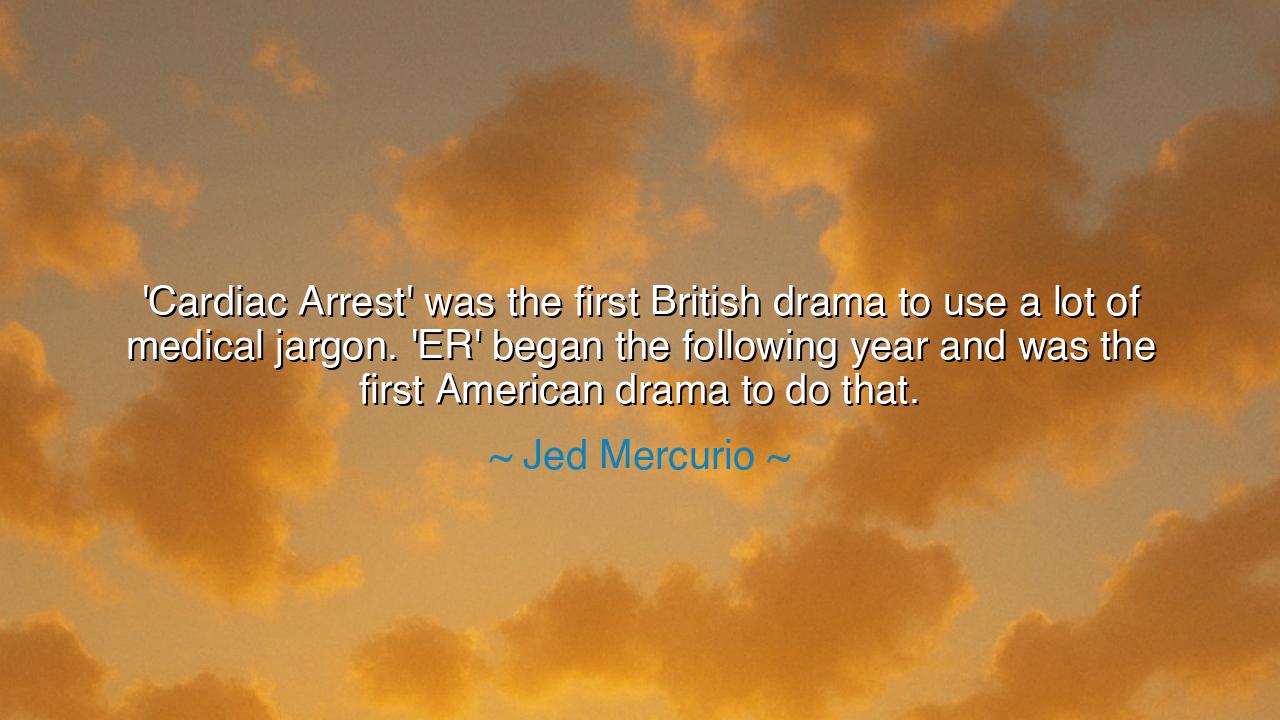
'Cardiac Arrest' was the first British drama to use a lot of
'Cardiac Arrest' was the first British drama to use a lot of medical jargon. 'ER' began the following year and was the first American drama to do that.






“‘Cardiac Arrest’ was the first British drama to use a lot of medical jargon. ‘ER’ began the following year and was the first American drama to do that.”
Thus spoke Jed Mercurio, physician turned writer, whose words stand not merely as a reflection on television, but as a meditation on truth, authenticity, and the courage to bring reality to art. Behind his observation lies a quiet revolution — the moment when storytelling shed its polished artifice and dared to speak in the language of real life. For Mercurio, the creator of Cardiac Arrest, the use of medical jargon was not a stylistic choice, but an act of integrity: to honor the world he knew, the world of hospitals, struggle, and human fragility, without diluting its truth for comfort or ease.
The origin of this quote traces back to the early 1990s, when Cardiac Arrest aired upon the screens of Britain. Until then, medical dramas had spoken in the soft, simplified tones of entertainment — the heart of their stories often noble, but their portrayal distant from the real pulse of medicine. Mercurio, himself a trained doctor, broke that tradition. He filled his script with the raw lexicon of the hospital — the clipped commands, the codes, the strange poetry of medical speech that, though foreign to the lay ear, carried within it the heartbeat of reality. Viewers were thrust into the true rhythm of life and death as doctors lived it, not as television imagined it. In doing so, he changed forever how audiences perceived the medical world.
His creation, Cardiac Arrest, was a testament to honesty — an insistence that truth, even when complex or uncomfortable, could captivate more deeply than any fabrication. The following year, across the Atlantic, another great work rose: ‘ER’, the American medical drama that would carry Mercurio’s torch into global fame. Both shows shared a spirit of realism. Their characters spoke not to please, but to act; their stories pulsed with urgency and imperfection. And in this, the audience found something astonishing — that reality itself is more dramatic than any fiction could ever be.
Mercurio’s quote, then, is more than historical record; it is a declaration of artistic philosophy. He reminds us that authenticity demands bravery. To speak truthfully — in art, in science, or in life — one must resist the temptation to simplify, to smooth the edges for the comfort of others. Just as a surgeon must cut through to heal, the artist must pierce through pretense to reveal what is real. The medical jargon in Cardiac Arrest was more than technical language; it was a symbol of respect — respect for the profession, for its practitioners, and for the reality of their world.
This lesson echoes throughout history. Consider the story of Émile Zola, the French novelist who, in his Rougon-Macquart series, wrote of the lives of the working class with unsparing realism. He, too, faced criticism for being “too technical,” “too harsh,” “too real.” Yet Zola believed, as Mercurio did, that truth itself has beauty, even when it discomforts. Like the physician who diagnoses a hidden wound, the artist who speaks truth heals society’s illusions. Both require courage — the courage to look unflinchingly at what is, rather than what is pleasing to see.
In this sense, Mercurio’s reflection becomes a parable of innovation. Every age has its creators who dare to abandon convention. The first who paints not gods but commoners; the first who writes not myth but experience; the first who films not fantasy but life. Such people bear criticism at first, for the world resists being reminded of its own imperfection. Yet in time, their work endures — not because it flatters, but because it rings with reality. Mercurio’s Cardiac Arrest may have been misunderstood by some, but it opened the path for ER, Grey’s Anatomy, House, and countless others to follow — all born from that moment when one man decided to let the truth speak in its own voice.
The lesson, then, is this: dare to be real. Whether in art, work, or speech, do not fear the complexity of truth. Simplicity pleases, but authenticity transforms. If you are a creator, do not write what others expect — write what you know to be true. If you are a leader, speak not what comforts, but what enlightens. If you are a learner, seek not the easy explanation, but the whole understanding. For it is through truth — intricate, imperfect, and alive — that human beings grow.
And so, let Jed Mercurio’s words echo as a reminder across generations: that progress in every field begins when someone dares to show the world as it truly is, not as it pretends to be. From the hospital ward to the writer’s desk, from the scientist’s lab to the artist’s stage, the same law holds — honesty is the highest form of art.






AAdministratorAdministrator
Welcome, honored guests. Please leave a comment, we will respond soon